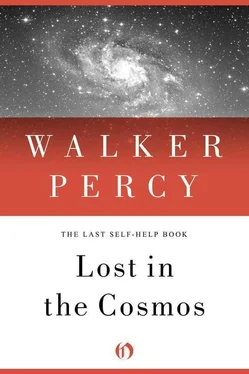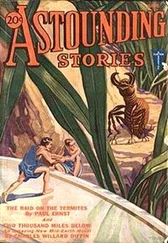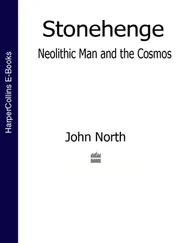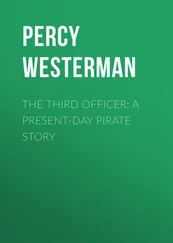My proposal: Will your craft fly like an airplane? Yes? Can you land it anywhere? Yes? Like a helicopter? Yes? Very well.
I propose a variant of Dr. Jane Smith’s proposal. I propose that you fly Dr. Jane Smith and the children and my odd little brood here and my two monks, yourself, and me, and whoever else wants to go, to Lost Cove, Tennessee.
There, as Dr. Jane Smith and I have reason to believe, the residual radiation is not so bad, that under the blue haze of the Smoky Mountains, the ultraviolet flare may not be excessive, and that your beautiful children may remain fertile.
Accordingly, I propose to you, Captain, that you accede to Dr. Jane Smith’s wish that I marry the two of you properly — your marriage in space by yourself is canonically suspect to say the least — and that I baptize the children in Lost Cove Creek.
I wish to come with you for one reason — otherwise, I would rather remain here in my beloved Utah and be let alone and die in peace — but I am obliged to be present to serve the survivors as priest and ordain as priest any one of them who might wish to become a priest, and to await the coming of the Lord if it is the end. I’d as soon wait for him here, but what can you do? Veh.
Why should you of Copernicus 4 believe any of these things, which must surely seem preposterous to you? The only reason, from your point of view, is that you have no choice. You know now that if what I say is not true, you are like the gentiles Paul spoke of: a stranger to every covenant, with no promise to hope for, with the world about you and no God. You are stuck with yourselves, ghost selves, which will never become selves. You are stuck with each other and you will never know how to love each other. Even if you succeed, you and your progeny will go to Europa and roam the galaxy, lost in the Cosmos forever.
I agree with Dr. Jones: we should leave as soon as possible — but for Tennessee, not for Europa.
Question: If you were the captain, which of the two proposals would you accept? or would you accept neither? Do you have a better idea?
(a) I’d go with Aristarchus Jones and the others to New Ionia.
(b) I’d marry Dr. Jane Smith and take her and the children to Lost Cove, Tennessee.
(c) I’d go to Qumran and fight with the Israelis.
(d) I’d go to Jordan and fight with the Arabs.
(e) I’d drop the abbot and Jane Smith in Tennessee, send the children to Europa with Jones and Tiffany, leaving me and Kimberly to take our chances in Uxmal.
(f) I’d take no chances. I’d cover all bets, even the million-to-one shot that there might be something to Abbot Leibowitz’s preposterous claim. I’d go with him and Jane and the children to Lost Cove, Tennessee, wait for whatever he’s waiting for, monitor my sperm count — yet keep Copernicus 4 fueled and ready to go. (This, roughly, was Dr. Jane Smith’s response, in a rather vulgar aside to the Captain, after hearing the abbot’s proposal, in which she lapsed into a dialect of her Southern Methodist origins: “Well, why not? Who knows? The whole thing is preposterous, of course: two niggers and a Jew claiming to be Roman Catholics, a Jewish pope and two black monks. Popery and monkery in the middle of nowhere. But what have we got to lose? They’re Christians, after all. I’ll go along with it, especially the marriage ceremony and the baptism.”)
(g) Other (specify).
(CHECK ONE)
Thought Experiment: An experiment in shifting one’s perspective toward the end of determining the relative preposterousness of modern Cartesian consciousness vis-à-vis the preposterousness of Judaeo-Christianity — that is, whether they are two unrelated preposterousnesses or whether one preposterousness is a function of another, i.e., whether Judaeo-Christianity is preposterous from the point of view of the modern scientific consciousness precisely to the degree that the latter has elevated itself from a method of knowing secondary causes to an all-construing quasi-religious view of the world — whether, in fact, the preposterousness of Judaeo-Christianity is not in fact an index of the preposterousness of the age.
Play the following game. Adopt the following perspective: the point of view of Aristarchus Jones (little or no effort is required of you if you are a creature of the age, that is, a rational, intelligent, well-educated, objective-minded denizen of the twentieth century, reasonably well versed in the sciences and the arts; we are all Aristarchus Jones):
Judaeo-Christianity is indeed a preposterous religion, far less compatible with the modern scientific temper than, say, Buddhism or Brahmanism.
Judaism, to begin with, is a preposterous religion. It proposes as a serious claim to truth and for our belief that a God exists as a spirit separate from us, that he made the Cosmos from nothing, that he made man, a creature of body and spirit, that man suffered a fall or catastrophe, and that as a consequence God entered into a unique covenant with one of the most insignificant tribes on one of the most insignificant planets of one of the most insignificant of the 100 billion stars of one of the billions and billions of galaxies of the Cosmos.
Protestant Christianity is even more preposterous than Judaism. It proposes not only all of the above but further, that God himself, the God of the entire Cosmos, appeared as a man, one man and no other, at a certain time and a certain place in history, that he came to save us from our sins, that he was killed, lay in a tomb for three days, and was raised from the dead, and that the salvation of man depends on his hearing the news of this event and believing it!
Catholic Christianity is the most preposterous of the three. It proposes, not only all of the above, but also that the man-god founded a church, appointed as its first head a likable but pusillanimous person, like himself a Jew, the most fallible of his friends, gave him and his successors the power to loose and to bind, required of his followers that they eat his body and drink his blood in order to have life in them, empowered his priests to change bread and wine into his body and blood, and vowed to protect this institution until the end of time. At which time he promised to return.
Second Perspective: Now the game requires that you make a 180-degree shift of point of view from the standard objective view of the Cosmos to a point of view from which you can see the self viewing the Cosmos.
From this new perspective, it can be seen at once that the objective consciousness of the present age is also preposterous.
The earth-self observing the Cosmos and trying to understand the Cosmos by scientific principles from which its self is excluded is, beyond doubt, the strangest phenomenon in all of the Cosmos, far stranger than the Ring Nebula in Lyra.
It, the self, is in fact the only alien in the entire Cosmos.
The modern objective consciousness will go to any length to prove that it is not unique in the Cosmos, and by this very effort establishes its own uniqueness. Name another entity in the Cosmos which tries to prove it is not unique.
The earth-self seeks to understand the Cosmos overtly according to scientific principles while covertly exempting itself from the same understanding. The end of this enterprise is that the self understands the mechanism of the Cosmos but by the same motion places itself outside the Cosmos, an alien, a ghost, outside a vast machinery to which it is denied entry.
Are these two preposterousnesses commensurate or incommensurate, related in direct proportion or unrelated?
That is to say, which of these two propositions is correct?
(1) As time goes on and our science and technology advance and our knowledge of the Cosmos expands, the Judaeo-Christian claim becomes ever more preposterous, anachronistic, and, not to mince words, simply unbelievable.
Читать дальше












